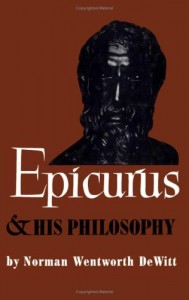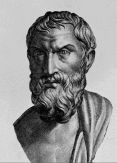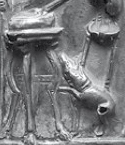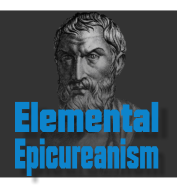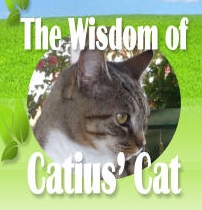Epicurus to Menoeceus, Greetings-
Let no one delay in the study of philosophy while he is young, and when he is old, let him not become weary of the study. For no man can ever find the time unsuitable or too late to study the health of his soul.
And he who asserts either that it is too soon to study philosophy, or that the hour is passed, is like a man who would say that the time has not yet come to be happy, or that it is too late to be happy.
So both the young and the old must study philosophy – that as one grows old he may be young in the blessings that come from the grateful recollection of those good things that have passed, and that even in youth he may have the wisdom of age, since he will know no fear of what is to come. It is necessary for us, then, to meditate on the things which produce happiness, since if happiness is present we have everything, and when happiness is absent we do everything with a view to possess it.
Now, I will repeat to you those things that I have constantly recommended to you, and I would have you do and practice them, as they are the elements of living well:
First of all, believe that a god is an incorruptible and happy being, just as Nature has commonly implanted the notion in the minds of men. But attach to your theology nothing which is inconsistent with incorruptibility or with happiness, and believe that a god possesses everything which is necessary to preserve its own nature.
Indeed the gods do exist, and Nature gives to us a degree of knowledge of them. But gods are not of the character which most people attribute to them, and the conception of the gods held by most people is far from pure. It is not the man who discards the gods believed in by the many who is impious, but he who applies to the gods the false opinions that most people entertain about them. For the assertions of most people about the gods are not true intuitions given to them by Nature, but false opinions of their own, such as the idea that gods send misfortune to the wicked and blessings to the good. False opinions such as these arise because men think of the gods as if they had human qualities, and men do not understand that the gods have virtues that are different from their own.
Next, accustom yourself to think that death is a matter with which we are not at all concerned. This is because all good and all evil come to us through sensation, and death brings the end of all our sensations. The correct understanding that death is no concern of ours allows us to take pleasure in our mortal lives, not because it adds to life an infinite span of time, but because it relieves us of the longing for immortality as a refuge from the fear of death. For there can be nothing terrible in living for a man who rightly comprehends that there is nothing terrible in ceasing to live.
Seen in this way, it was a silly man who once said that he feared death, not because it would grieve him when it was present, but because it grieved him now to consider it to be coming in the future. But it is absurd that something that does not distress a man when it is present should afflict him when it has not yet arrived. Therefore the most terrifying of fears, death, is nothing to us, since so long as we exist death is not present with us, and when death comes, then we no longer exist. Death, then, is of no concern either to the living or to the dead – to the living, death has no existence, and to the dead, no concerns of any kind are possible.
Many people, however, flee from death as if it were the greatest of evils, while at other times these same people wish for death as a rest from the evils of life. But the wise man embraces life, and he does not fear death, for life affords the opportunity for happiness, and the wise man does not consider the mere absence of life to be an evil. Just as he chooses food not according to what is most abundant, but according to what is best; so too, the wise man does not seek to live the life that is the longest, but the happiest.
And so he who advises a young man to live well, and an old man to die well, is a simpleton, not only because life is desirable for both the young and the old, but also because the wisdom to live well is the same as the wisdom to die well.
Equally wrong was the man who said:
‘Tis well not to be born, but when born, tis well to pass with quickness to the gates of Death.
If this was really his opinion, why then did he not end his own life? For it was easily in his power to do so, if this was really his belief. But if this man was joking, then he was talking foolishly in a case where foolishness ought not be allowed.
As to how we live our lives, we must always remember that the future does not wholly belong to us. But on the other hand, the future does not wholly NOT belong to us either. In this I mean that we can never wait on the future with a feeling of certainty that it will come to pass, but neither can we despair that the future is something that will never arrive.
We must also consider that some of our human desires are given to us by Nature, and some are vain and empty. Of the Natural desires, some are necessary, and some are not. Of the necessary desires, some are necessary to our happiness, and some are necessary if our body is to be free from trouble. Some desires are in fact necessary for living itself. He who has a correct understanding of these things will always decide what to choose and what to avoid by referring to the goal of obtaining a body that is healthy and a soul that is free from turmoil, since this is the aim of living happily. It is for the sake of living happily that we do everything, as we wish to avoid grief and fear. When once we have attained this goal, the storm of the soul is ended, because we neither have the need to go looking for something that we lack, nor to go seeking something else by which the good of our soul or of our body would be improved.
For you see when we lack pleasure and we grieve, we have need of pleasure, because pleasure is not present. But so long as we do not grieve, life affords us no lack of pleasure. On this account we affirm that Nature has provided that Pleasure is the beginning and end of living happily; for we have recognized that Nature has provided that happiness is the first good that is innate within us. To this view of Happiness as our starting point and as our goal we refer every question of what to choose and what to avoid. And to this same goal of happy living we again and again return, because whether a thing brings Happiness is the rule by which we judge every good. But although happiness is the first and a natural good, for this same reason we do not choose every pleasure whatsoever, but at many times we pass over certain pleasures when difficulty is likely to ensue from choosing them. Likewise, we think that certain pains are better than some pleasures, when a greater pleasure will follow them, even if we first endure pain for time.
Every Pleasure is therefore by its own Nature a good, but it does not follow that every pleasure is worthy of being chosen, just as every pain is an evil, and yet every pain must not be avoided. Nature requires that we resolve all these matters by measuring and reasoning whether the ultimate result is suitable or unsuitable to bringing about a happy life; for at times we may determine that what appears to be good is in fact an evil, and at other times we may determine that what appears to be evil is in fact a good.
As we pursue happiness we also hold that self-reliance is a great good, not in order that we will always be satisfied with little, but in order that if circumstances do not allow that we have much, we may wisely make use of the little that we have. This is because we are genuinely persuaded that men who are able to do without luxury are the best able to enjoy luxury when it is available.
We also believe that Nature provides that everything which is necessary to life is easily obtained, and that those things which are idle or vain are difficult to possess. Simple flavors give as much pleasure as costly fare when everything that causes pain, and every feeling of want, is removed. Bread and water give the most extreme pleasure when someone in great need eats of them. To accustom oneself, therefore, to simple and inexpensive habits is a great ingredient towards perfecting one’s health, and makes one free from hesitation in facing the necessary affairs of life. And when on certain occasions we fall in with more sumptuous fare, this attitude renders us better disposed towards luxuries, as we are then fearless with regard to the possibility that we may thereafter lose them.
When, therefore, we say that pleasure or happiness is the chief good, we are not speaking of the pleasures of debauched men, or those pleasures which lie in sensual enjoyment, as some allege about us who are ignorant, or who disagree with us, or who perversely misrepresent our opinions. Instead, when we speak of pleasure or happiness as the chief good, we mean the freedom of the body from pain and the freedom of the soul from confusion. For it is not continued drinking and reveling, or the temporary pleasures of sexual relations, or feasts of fish or such other things as a costly table supplies that make life pleasant. Instead, Nature provides that life is made pleasant by sober contemplation, and by close examination of the reasons for all decisions we make as to what we choose and what we avoid. It is by these means that we put to flight the vain opinions from which arise the greater part of the confusion that troubles the soul.
Now, the beginning and the greatest good of all these things is wisdom. Wisdom is something more valuable even than philosophy itself, inasmuch as all the other virtues spring from it. Wisdom teaches us that it is not possible to live happily unless one also lives wisely, and honestly, and justly; and that one cannot live wisely and honestly and justly without also living happily. For these virtues are by nature bound up together with the happy life, and the happy life is inseparable from these virtues.
Considering this, who can you think to be a better man than he who has holy opinions about the gods, who is utterly fearless in facing death, who properly contemplates the goals and limits of life as fixed by Nature, and who understands that Nature has established that the greatest goods are readily experienced and easily obtained, while the greatest evils last but a short period and cause only brief pain?
The wise man laughs at the idea of “Fate,” which some set up as the mistress of all things, because the wise man understands that while some things do happen by chance, most things happen due to our own actions. The wise man sees that Fate or Necessity cannot exist if men are truly free, and he also sees that Fortune is not in constant control of the lives of men. But the wise man sees that our actions are free, and because they are free, our actions are our own responsibility, and we deserve either blame or praise for them.
It would therefore be better to believe in the fables that are told about the gods than to be a slave to the idea of Fate or Necessity as put forth by false philosophers. At least the fables which are told about the gods hold out to us the possibility that we may avert the gods’ wrath by paying them honor. The false philosophers, on the other hand, present us with no hope of control over our own lives, and no escape from an inexorable Fate.
In the same way, the wise man does not consider Fortune to be a goddess, as some men esteem her to be, for the wise man knows that nothing is done at random by a god. Nor does he consider that such randomness as may exist renders all events of life impossible to predict. Likewise, he does not believe that the gods give chance events to men so as to make them live happily. The wise man understands that while chance may lead to great good, it may also lead to great evil, and he therefore thinks it to be better to be unsuccessful when acting in accord with reason than to be successful by chance when acting as a fool.
Meditate then, on all these things, and on those things which are related to them, both day and night, and both alone and with like-minded companions. For if you will do this, you will never be disturbed while asleep or awake by imagined fears, but you will live like a god among men. For a man who lives among immortal blessings is in no respect like a mortal being.






